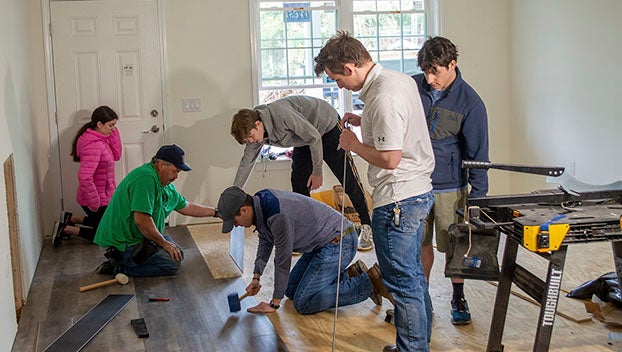Mike Wilson: Of fictive kinship, Hampden-Sydney and an old legend
Published 12:45 am Saturday, January 27, 2024

- Students help at a local Habitat for Humanity build site by laying flooring.
|
Getting your Trinity Audio player ready...
|
After I lectured to a Hispanic culture class at Hampden-Sydney College about the profound importance of “fictive kinship” in Latino societies, I began to think about my own “fictive kin”.
First off, what is fictive kinship, you ask. These would be social bonds unrelated to blood or marriage. For those who were at Hampden-Sydney, think of your time spent with your fraternity, or the basketball or football team. Were these not your brothers? Did you not consider them family, and still do? One might argue those bonds are the most important thing you take away from your time at college, wherever it is.
And so, as I lectured on this, it got me thinking about my “river uncles.” Let me tell you the legend of “Uncle” Vaudie and see if you don’t think of some fictive kinship bonds of your own along the way.
The legend of Uncle Vaudie
“Uncle” Vaudie had a cabin on Lick Creek four cabins down the road from my grandparents’. He and his wife Juanita had become fast friends with Granddaddy and Grandmommy after they built their place at roughly the same time our houseboat was hauled up permanently into the woods just down the gravel road. Their cabin was right next door (perhaps they even shared a lot?) to “Uncle” John Andrew and his wife Elizabeth, Juanita’s sister.
I discover now that Uncle Vaudie had been born in 1907, so he had lived through the hardships of the Depression and World War II. A web search for his tombstone shows that he was a private in the U.S. Army during that terrible conflict. He was most certainly against any type of waste: many a time I would find him at the cleaning table by the boathouse, scaling a batch of small bream with a teaspoon.
He and his wife kept and ate absolutely everything they caught. I also saw once that they had rinsed off some paper plates and clipped them on the clothesline so they could use them again. Though it has been almost 50 years since I saw him last, I can still picture him perfectly with his sweat-stained pith helmet — just like Jungle Jim’s — and steel-rimmed glasses heading out early in the morning in his small Alumacraft. (All four of the vessels that shared that boathouse were 14 feet long; this was long before the advent of the modern bass battleship.) All the ladies — my grandmother and the two sisters — always wore very large straw sun hats.
Offering thanks for fictive kinship
Meanwhile, I seem to recall that Uncle John Andrew had retired from the U.S. Border Patrol and returned to Tennessee from the southwest. He was by far the quieter of the two, and I can see him puffing on his pipe and pondering how to answer the incessant questions of a very curious boy. It may be that his tales even led me subconsciously to the study of Spanish.
His surname was Hawk, which makes me wonder whether he perhaps had a touch of Native American blood. His boat had a blue and silver hull (one of few thereabouts) that I could spot way across the lake. To my knowledge, he and his wife did not eat all their bream; they probably gave them to Uncle Vaudie!
As good Baptist role models, my grandparents did not imbibe when the grandkids were visiting, but I have the feeling that on other weekends when we weren’t present they may have enjoyed an occasional libation with those dear old friends. I did once overhear Granddaddy remark to Uncle Vaudie that the next weekend he intended to make a batch of “lemonade, made in the shade and stirred with a spade…” I’m going to hazard a guess that the recipe involved spirits…
Oh, fictive kin. I remember those dear “uncles” and “aunts” now so fondly, and I wish I could have thanked them for the kindness and patience and generosity they showed me as a little boy. If you have “kin” like them, please tell them how much they mean to you before it’s too late.
MIKE WILSON is a former Hampden-Sydney Spanish professor and 13-year resident of Prince Edward County, who now calls North Carolina home. He can be reached at jmwilson@catawba.edu.

